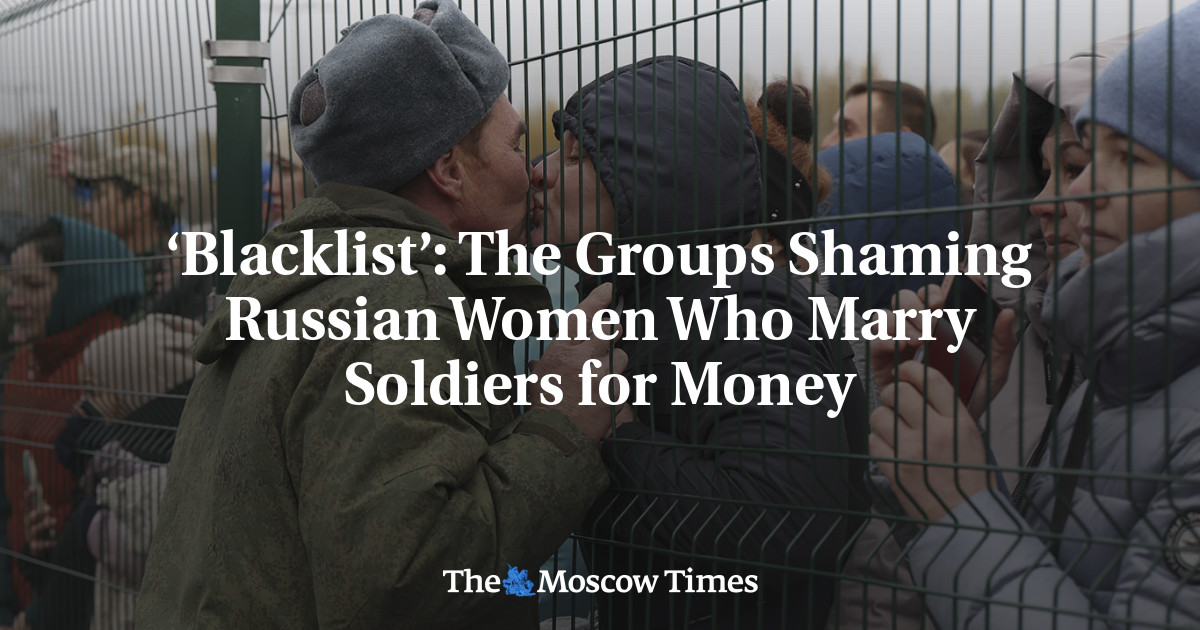
‘Blacklist’: The Groups Shaming Russian Women Who Marry Soldiers for Money
How did your country report this? Share your view in the comments.
Diverging Reports Breakdown
‘Blacklist’: The Groups Shaming Russian Women Who Marry Soldiers for Money
Women suspected of marrying a soldier for money rather than love can increasingly expect to become a target of widespread vitriol online. The idea behind Blacklist SVO came from a discussion on the popular VKontakte page Overheard at the SVO. In April, pro-war blogger Anastasia Kashevarova publicly called for the punishment of the 21-year-old widow of Russian soldier Georgy Kostyrko. “The state should not be paying blood-soaked money to whores. It discredits both the army and the image of Russian women,” she wrote on her Telegram channel, which has nearly 250,000 subscribers. During wartime, traditional gender roles tend to become more rigid and deeply binary, a journalist and fellow at the Center for Women, Peace and Security at the London School of Economics told The Moscow Times. “The only goal of this kind of online harassment is to intimidate women and publicly ‘put them in their place’ during wartime,” she said.
A man and a woman during a ceremony to send off mobilized Russian citizens. Sergei Kiselev / Moskva News Agency
During wartime, traditional gender roles tend to become more rigid and deeply binary, Natalia Baranova, a journalist and fellow at the Center for Women, Peace and Security at the London School of Economics, told The Moscow Times. “A man must be a protector, and a woman must support him in everything. This norm is built on gender-based violence and discrimination. These ideas make it possible to justify war, to participate in it, and to sustain a militaristic discourse where only the interests of the state matter — not those of the individual,” she said. The roots of this cyberbullying may lie in dominant gender norms in Russia, gender researcher Dasha Manzhura told The Moscow Times. “Stepping outside the socially accepted gender norm appears as an attack on the group identity of women who respond aggressively,” she said. “Their actions are driven both by a desire to defend themselves and by fear that their worldview is being shaken.” “The only goal of this kind of online harassment is to intimidate women and publicly ‘put them in their place’ during wartime. This isn’t about women’s solidarity,” said Baranova. “Solidarity in this case would mean recognizing shared pain — poverty and inequality in the country, and the instability and insecurity women face.”
Some of the targeted women are even forced to issue public apologies. In April, police in the Tomsk region released a video of a real estate agent apologizing after she jokingly advised women to use compensation payments intended for relatives of fallen soldiers to buy apartments. “It really turned out horribly. I ask for your forgiveness,” Marina Orlova says in her apology. Later, a local court sentenced Orlova and the blogger who interviewed her to 80 hours of mandatory community service. The court found the women guilty of inciting hatred and humiliating human dignity. Regional journalists have even produced dedicated reports about so-called “predatory” women. On a local TV channel in the city of Nizhny Novgorod, reporters filmed a segment on a soldier named Mikhail who transferred 900,000 rubles ($11,300) to his ex-wife Yekaterina. The couple had married shortly after Mikhail returned on leave from the war in Ukraine. Speaking to reporters, he said he fell victim to what he believes was a scam. “She stopped replying to my messages after the last [money] transfer. She blocked me on social media,” he says, wearing a camouflage face covering. Mikhail claimed he continued sending her money because he genuinely hoped to start a family.
A man hugs a woman during a send-off ceremony at the Chita railway station. Yevgeny Epanchintsev / TASS
“It hurts that we’re defending the Motherland, people, the elderly, women — and back home, there are people like this who just take the money [from a soldier] and disappear,” says Mikhail. He plans to file charges against his ex-wife in court and with the police. In online dating groups, many soldiers now explicitly state that they are only looking for “pure” love. “Tired of greedy and materialistic women. I just want a simple family life,” says Ilya, a soldier currently fighting in Ukraine. He attaches a photo of himself in uniform, explaining that he’s self-conscious about a scar from a wound. “So nice to read… Every word says: Man,” One subscriber named Anzhelika writes in the comments below his post. Others write that “scars make a man handsome” in hopes of making a connection. In other cases, women themselves stress they are not after soldiers’ money. “I’m self-sufficient, not materialistic, independent, sociable, cheerful, with a sense of humor,” writes a 27-year-old single woman from St. Petersburg.
